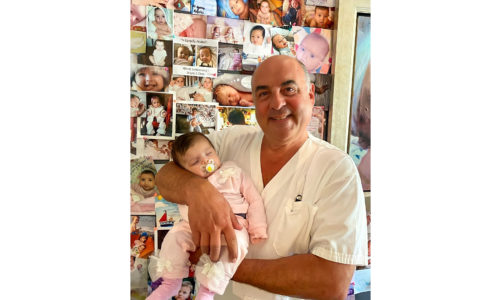
In a world where most pandemic safety protocols have evaporated, where is the sense of urgency to treat, or at the very least support, people with long COVID?
Early in the pandemic, we saw significant mobilization of the health care infrastructure across the world to determine how to prevent and treat COVID-19, leading to substantial reduction in morbidity and mortality. Conversely, the response to long COVID has been muted. In the rush to declare the pandemic over, the low quality of life experienced by millions with long COVID has apparently been deemed acceptable. It is not acceptable.
My firsthand knowledge of long COVID began in July 2020. Social distancing protocols were still in effect, masks were mandated in most of the country, and vaccines for the “novel coronavirus” were a distant hope. This was when I contracted COVID-19. I had the usual symptoms of fever, loss of taste and smell, and shortness of breath. But as my symptoms lingered even weeks later, I wondered when I would recover. Weeks turned into months. And months eventually turned into years.
Three years later, I have learned to manage long COVID — which in my case includes extreme fatigue, near-constant headaches and the relentless need to restrict activities of daily living to avoid exacerbating symptoms. Long COVID can include a wide variety of other debilitating effects, including cardiac dysfunction and memory loss. To put it in perspective: It leaves many with a quality of life worse than what people with advanced cancer experience.
There are at least 65 million people across the world and an estimated 6% of adults in the United States who live with long COVID, and new cases are added every day. It has left at least 4 million Americans unable to work. You can imagine why 20% of people with long COVID have difficulty paying for housing, including many whose disability claims are denied. Accompanying these devastating symptoms and lack of support is an increased suicide risk. If you think you don’t know anyone with long COVID, think again. Most people choose not to disclose it, even to close friends.
Three years into the pandemic, a modest number of clinical trials related to long COVID are underway or in the planning phases. Most of these trials have small sample sizes and therefore will be able to detect only large effects within their cohort. They are likely to miss more subtle and less common effects, which we expect to be prevalent given the broad range of presentations of long COVID. Even worse, many use graded exercise therapy as an intervention. This is well documented to be harmful to the 80% of long COVID patients whose symptoms worsen following even minor exertion.
Considering this mounting issue solely from an economic perspective, Congress should be incentivized to help people with long COVID improve their health and return to the workforce, which would improve economic productivity and reduce national health care costs. The estimated total economic cost of long COVID was $3.7 trillion as of July 2022. Funding a nationwide infrastructure to conduct better clinical trials would give patients real answers and would be significantly less expensive than letting us suffer — by hundreds of billions of dollars.
Unfortunately, our country’s (lack of) response to long COVID is not surprising, as we have a dark history of neglecting chronic conditions, particularly those that are more common in women.
It is ironic that individuals with a severely energy-limiting disease are using their limited energy to protest and request help, even though such exertion can worsen our symptoms.
We cannot continue dismissing chronic diseases. We need much more help for long COVID patients now.
This help must come in many forms. First, the National Institutes of Health, philanthropy groups, the pharmaceutical industry and biotech companies can urgently dedicate funding to better clinical trials. Insurance companies and government programs could also provide adequate disability and medical coverage.
Honest public health communication is necessary as well to raise awareness about how debilitating this illness can be, so our society is cognizant of the ongoing risks that come with a COVID infection. And finally, members of the general public can provide support to the people in their lives who have long COVID, while joining efforts to advocate for change.
At a substantial personal cost, I have learned to accept my long COVID. But I am unwilling to accept the lack of action to help those with long COVID.
Julia Moore Vogel is a program director at Scripps Research Translational Institute in La Jolla. ©2023 Los Angeles Times. Distributed by Tribune Content Agency.
𝗖𝗿𝗲𝗱𝗶𝘁𝘀, 𝗖𝗼𝗽𝘆𝗿𝗶𝗴𝗵𝘁 & 𝗖𝗼𝘂𝗿𝘁𝗲𝘀𝘆: www.mercurynews.com
𝗙𝗼𝗿 𝗮𝗻𝘆 𝗰𝗼𝗺𝗽𝗹𝗮𝗶𝗻𝘁𝘀 𝗿𝗲𝗴𝗮𝗿𝗱𝗶𝗻𝗴 𝗗𝗠𝗖𝗔,
𝗣𝗹𝗲𝗮𝘀𝗲 𝘀𝗲𝗻𝗱 𝘂𝘀 𝗮𝗻 𝗲𝗺𝗮𝗶𝗹 𝗮𝘁 dmca@enspirers.com




